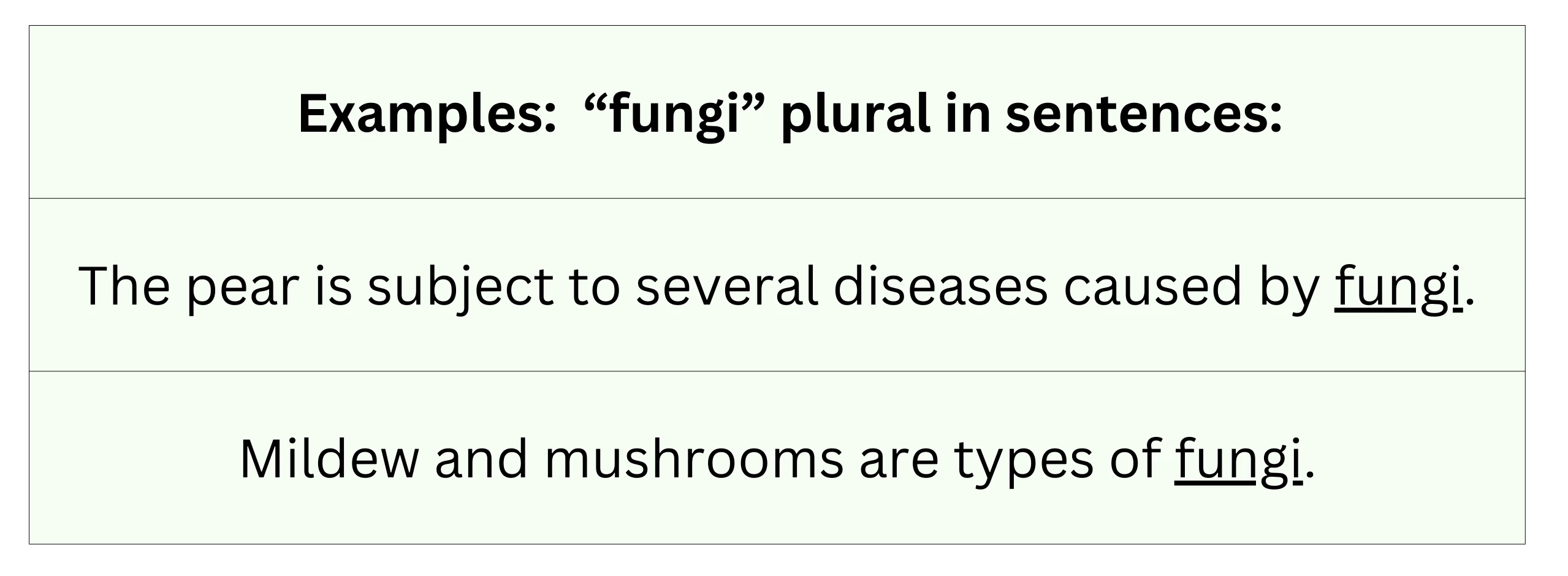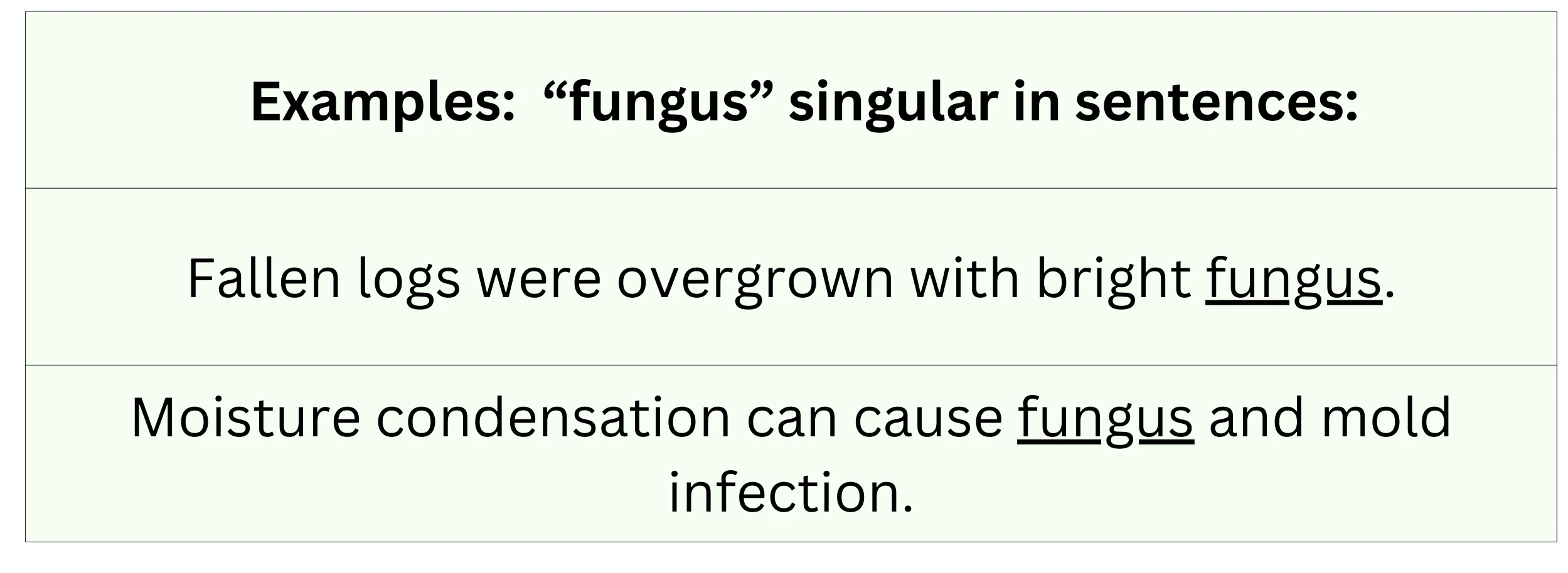What’s the plural of “fungus”?
Both funguses and fungi are acceptable plurals to refer to this widespread category species and organism.
Many types of fungi grow in this damp environment.
Several funguses were visible on the decaying log.
I observed numerous fungus during my hike.
Only one fungi was identified by the scientist.

What are fungi/funguses?
Brittanica online defines fungi as:
Any of about 144,000 known species of organisms of the kingdom Fungi, which includes the yeasts, rusts, smuts, mildews, molds, and mushrooms“, (fungus). Many people think of fungus as mushrooms, in conversation and informal speech.
Is fungus/fungi a regular or irregular plural noun?

The Americanized plural, fungases, is a regular plural noun form since it uses the -es. That said, funguses most likely came to be accepted overtime due to the widespread misuse of the correct and original plural form of fungus, i.e, fungi. While an irregular plural in English, fungi are not alone: octopus, alumnus, cactus, hippopotamus and the like all share the same (or similar) ending singular and plural forms. See the following chart that illustrates both:
| singular | plural |
| cactus | cacti (or cactuses) |
| octopus | octopi (or octopuses) |
| radius | radi (or radiuses) |
| fungus | fungi (or funguses) |
| alumnus | alumni (or almunuses) |
| syllabus | syllabi (or syllabuses) |
Fungi is the original Latinate plural, and uses one of the distinct Latin suffixes, i.e., -I. Likewise, the fungi‘s companion nouns similarly use their Latin (or near Latin) words/forms in Modern English today. Cactus, octopus, alumnus, syllabus, and so on all use the Latinate -I suffix, and have conserved their form since its inception (or near inception) as a word/noun.
Therefore, fungi, is irregular as a plural noun; likewise, cacti, octopi, alumni, syllabi are all Latinate in plural form as well, and are, to that extent, irregular. They’re also the original, antiquated form of the word, and a reminder that we all know a little bit of Latin!
For fungus plurals, remember ‘funguses’ adds -es, and ‘fungi’ follows the irregular -us to -i pattern like cactus/cacti.
Examples of fungus in used sentences:
Sentence examples of fungus are borrowed from Brittanica:
1. Ultimately, we are left in the untenable position of admitting that there is no definition in general use for the word “fungus.”
2. Grapes attacked by the fungus; the fruit becomes black, hard and shrivelled.
3. The Latin word for mushroom, fungus (plural fungi), has come to stand for the whole group.
4. The mushroom is just the part of the fungus we see above ground which is also known as the fruiting body.
5. Many of these fungus-like organisms are included in the kingdom Chromista.
Examples of fungi in used sentences:
Sentence examples of fungi are borrowed from Brittanica.
1. The Fungi are the great saprophytes, the master recyclers.
2. The rich colour of the grass is due to the fertilizing quality of the decaying fungi, which are peculiarly rich in nitrogenous substances.
3. Fungi draw their nutrition from decaying organic matter, living plants and even animals.
4. Fungi reproduce through spores, which are like asexual plant seeds.
5. Examples of fungi are yeasts, rusts, stinkhorns, puffballs, truffles, molds, mildews and mushrooms.
6. The study of fungi is known as mycology—a broad application of the Greek word for mushroom, mykēs.
Origin of the word fungus
The word fungus/fungi derives from the exact same word in Latin: fungus. Fungus is believed to have been connected to, or brought down from the Ancient Greek sphongos.
What’s the difference between they’re, their, and there?
Work Sheet
According to the blog post, which two forms are acceptable plurals of “fungus”?
Which plural form of “fungus” is described as the irregular, original Latinate form?
The plural form “funguses” follows which type of English plural rule?
Using the singular form “fungus” with a plural quantifier like “numerous” is identified in the post as:
Which of the following nouns, also listed in the post, has a similar Latinate irregular plural ending in -i?
Many types of grow in this damp environment. (Based on usage example)
Several were visible on the decaying log. (Based on usage example)
During the nature walk, we saw numerous .
Only one was identified by the scientist.
The scientists identified a single on the tree bark.
Frequently Asked Questions
What are the plural forms of fungus?
+
Which fungus plural is irregular?
+
Which plural form is the original Latin?
+
How should I use fungus plurals?
+
What plural fungus mistakes are common?
+
Yash, D. "What’s the Plural of Fungus?." Grammarflex, Jun 18, 2025, https://www.grammarflex.com/whats-the-plural-of-fungus/.
Sources
-
Brittanica, fungus.











